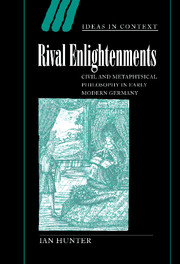Book contents
- Frontmatter
- Contents
- Preface
- Acknowledgements
- List of abbreviations and texts used
- Note on conventions
- Introduction
- PART I RIVAL ENLIGHTENMENTS
- PART II CIVIL AND METAPHYSICAL PHILOSOPHY
- 3 Leibniz's political metaphysics
- 4 Pufendorf's civil philosophy
- 5 Thomasius and the desacralisation of politics
- 6 Kant and the preservation of metaphysics
- Postscript: The kingdom of truth and the civil kingdom
- List of references
- Index
- IDEAS IN CONTEXT
5 - Thomasius and the desacralisation of politics
Published online by Cambridge University Press: 22 September 2009
- Frontmatter
- Contents
- Preface
- Acknowledgements
- List of abbreviations and texts used
- Note on conventions
- Introduction
- PART I RIVAL ENLIGHTENMENTS
- PART II CIVIL AND METAPHYSICAL PHILOSOPHY
- 3 Leibniz's political metaphysics
- 4 Pufendorf's civil philosophy
- 5 Thomasius and the desacralisation of politics
- 6 Kant and the preservation of metaphysics
- Postscript: The kingdom of truth and the civil kingdom
- List of references
- Index
- IDEAS IN CONTEXT
Summary
INTRODUCTION
Christian Thomasius (1655–1728) was the leading exponent of Pufendorfian civil philosophy in late-seventeenth- and early-eighteenth-century Protestant Germany. Given that he was also a famous – or notorious, depending on one's viewpoint – anti-scholastic educational reformer, and considering the standing he achieved as an academic, cultural commentator, and jurisconsult to the Brandenburg-Prussian state, one of the most puzzling aspects of Thomasius is his current relative obscurity. Until very recently, in the Anglophone academy the significance of his multifaceted work has been known only to a handful of specialists (Barnard 1965; Barnard 1989; Beck 1969, 247–56; Haakonssen 1997; Schneewind 1998, 159–66). The appearance of important new studies by younger scholars suggests that this situation might be changing (Ahnert 1999; Hochstrasser 2000; P. Schröder 1997). Even in Germany however Thomasius has been described as ‘forgotten’ (W. Schmidt 1995). It is true that the Germanists of the 1920s claimed him as a hero of the Frühaufklärung, yet Frank Grunert's bibliography suggests that serious attention to Thomasius' jurisprudential, political, and ethical work is largely a post-war development, picking up momentum during the seventies and eighties (Grunert 1989; Grunert 1996a). It is likely that this renewed interest in Thomasius, and in early modern natural law and practical philosophy more generally, has been driven by German moral philosophy's post-war concern to recover an ethical basis for politics (Dreitzel 1973; Dreitzel 1980).
- Type
- Chapter
- Information
- Rival EnlightenmentsCivil and Metaphysical Philosophy in Early Modern Germany, pp. 197 - 273Publisher: Cambridge University PressPrint publication year: 2001

